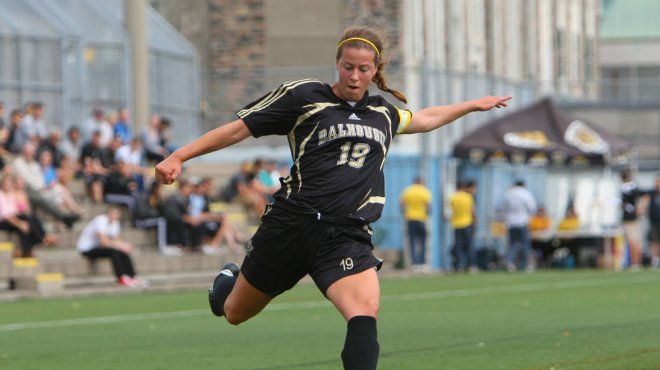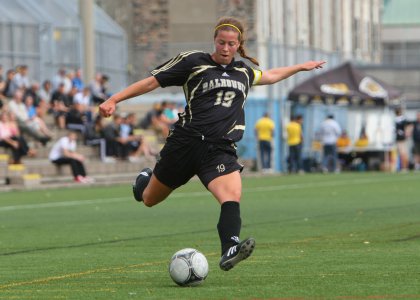
From field to office
As told to Stephanie Taylor
 After years of juggling course work with university-level sport, student athletes are at a competitive advantage when it comes to professional hardball. Rieka Santilli (BComm’12) played soccer on the Dal womens’ team for five years. During her time playing for Dal, she was a team captain and a two-time female athlete of the year. We recently sat down with Santilli to ask her how her experience as an athlete translates from the field to her job as a chartered accountant.
After years of juggling course work with university-level sport, student athletes are at a competitive advantage when it comes to professional hardball. Rieka Santilli (BComm’12) played soccer on the Dal womens’ team for five years. During her time playing for Dal, she was a team captain and a two-time female athlete of the year. We recently sat down with Santilli to ask her how her experience as an athlete translates from the field to her job as a chartered accountant.
What personal growth did you experience through playing athletics?
Time management is a huge one. You’re playing so much; you have to overcome the physical exhaustion while you’re still reaching your academic goals. You really need to find a balance. I personally did better academically when I was in season because I had a limited time to get it done.
Now a few years out of university and into a career, do those time management skills still come in handy?
Definitely. To get your designation as a chartered accountant (CA) it’s very, very time consuming so you’re required to work full time. You have 40 plus hours of work and then you have 15 to 20 hours of study time on top of that each week. And of course, you have to find time for other things like family, friends and your health. For me, before every exam in university I would just go to a soccer field and kick [the ball] around by myself and I kind of continued that throughout getting my CA.
How did being part of a team a give you insight into working with others?
When I was team captain I really became aware of how different people liked to be spoken to on and off the field. With about 18 players dressing plus extras you sometimes had up to 25 girls sharing a locker room and getting onto the field together. There were a lot of personalities. It was very emotional for a lot of players and everyone wants to play, so when things aren’t going your way there’s stuff that has to be dealt with.
Do these interpersonal skills translate to your current professional work?
It relates to it in a different way, but it is relatable for sure. I do work in teams, but much smaller teams now. Everyone has a different schedule and a different view —you have to be open and patient. I’m able to delegate and work through situations no matter what happens.
What did you learn about failure?
There were a lot of games when you were expected to win and you might draw or lose and you just have to go work again for it. You really have to be ready for anything and just persevere through it. When I was working toward getting my CA there were times when I’d work, work, work and not get a grade that I desired. There were several times I wanted to give up because I’d be at work until midnight trying to get everything done, but I had to just keep going.
At the end of the day, what was the biggest takeaway from your years as a student-athlete?
To be able to look back and say that I did it, that I was able to actively participate for five years and still finish school. It’s a personal accomplishment. It looks good on my resume, but in the end it’s more of a personal victory.